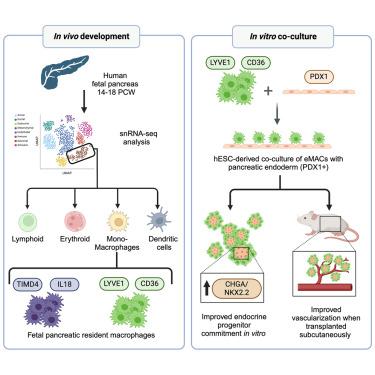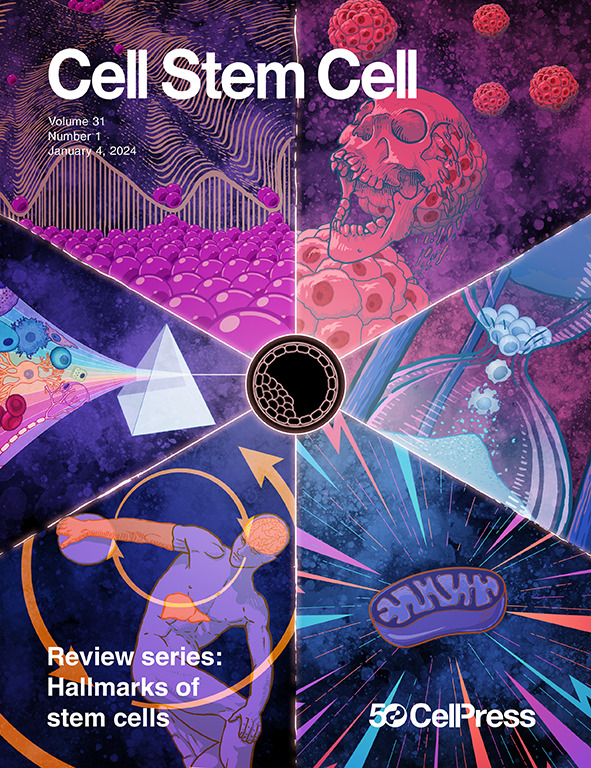胚胎巨噬细胞支持人类胰腺分化过程中的内分泌承诺
IF 19.8
1区 医学
Q1 CELL & TISSUE ENGINEERING
引用次数: 0
摘要
器官生成是一个复杂的过程,有赖于微环境中外在因素和组织特异性内在因素之间的动态相互作用。对于胰腺内分泌细胞来说,局部龛位包括胰腺尖细胞和导管细胞以及神经元、免疫细胞、内皮细胞和基质细胞。早在受孕后 6 周,人类胰腺中就检测到了造血细胞,但它们是否在人类内分泌生成过程中发挥作用仍是未知数。为了研究这个问题,我们对第二胎人类胰腺进行了单核 RNA 测序(snRNA-seq),发现了多种造血细胞,包括两个不同的组织驻留巨噬细胞亚群。利用这一发现,我们开发了人类胚胎干细胞衍生的内分泌-巨噬细胞器官组织共培养系统,以模拟它们在体外的相互作用。在这里,我们展示了巨噬细胞支持内分泌细胞在体外的分化和存活,并增强组织移植,突出了它们在糖尿病组织工程策略中的潜在作用。本文章由计算机程序翻译,如有差异,请以英文原文为准。

Embryonic macrophages support endocrine commitment during human pancreatic differentiation
Organogenesis is a complex process that relies on a dynamic interplay between extrinsic factors originating from the microenvironment and tissue-specific intrinsic factors. For pancreatic endocrine cells, the local niche consists of acinar and ductal cells as well as neuronal, immune, endothelial, and stromal cells. Hematopoietic cells have been detected in human pancreas as early as 6 post-conception weeks, but whether they play a role during human endocrinogenesis remains unknown. To investigate this, we performed single-nucleus RNA sequencing (snRNA-seq) of the second-trimester human pancreas and identified a wide range of hematopoietic cells, including two distinct subsets of tissue-resident macrophages. Leveraging this discovery, we developed a co-culture system of human embryonic stem cell-derived endocrine-macrophage organoids to model their interaction in vitro. Here, we show that macrophages support the differentiation and viability of endocrine cells in vitro and enhance tissue engraftment, highlighting their potential role in tissue engineering strategies for diabetes.
求助全文
通过发布文献求助,成功后即可免费获取论文全文。
去求助
来源期刊

Cell stem cell
生物-细胞生物学
CiteScore
37.10
自引率
2.50%
发文量
151
审稿时长
42 days
期刊介绍:
Cell Stem Cell is a comprehensive journal covering the entire spectrum of stem cell biology. It encompasses various topics, including embryonic stem cells, pluripotency, germline stem cells, tissue-specific stem cells, differentiation, epigenetics, genomics, cancer stem cells, stem cell niches, disease models, nuclear transfer technology, bioengineering, drug discovery, in vivo imaging, therapeutic applications, regenerative medicine, clinical insights, research policies, ethical considerations, and technical innovations. The journal welcomes studies from any model system providing insights into stem cell biology, with a focus on human stem cells. It publishes research reports of significant importance, along with review and analysis articles covering diverse aspects of stem cell research.
 求助内容:
求助内容: 应助结果提醒方式:
应助结果提醒方式:


